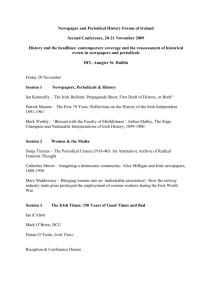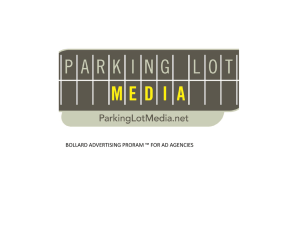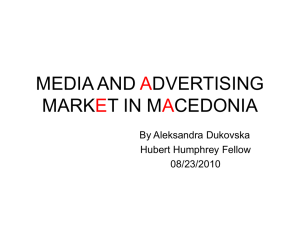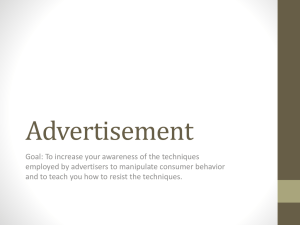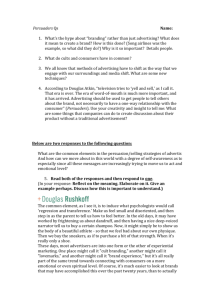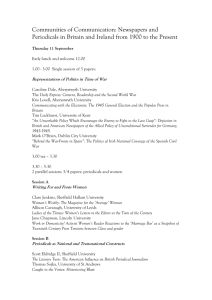November 2011 Submission by National Newspapers of Ireland
advertisement
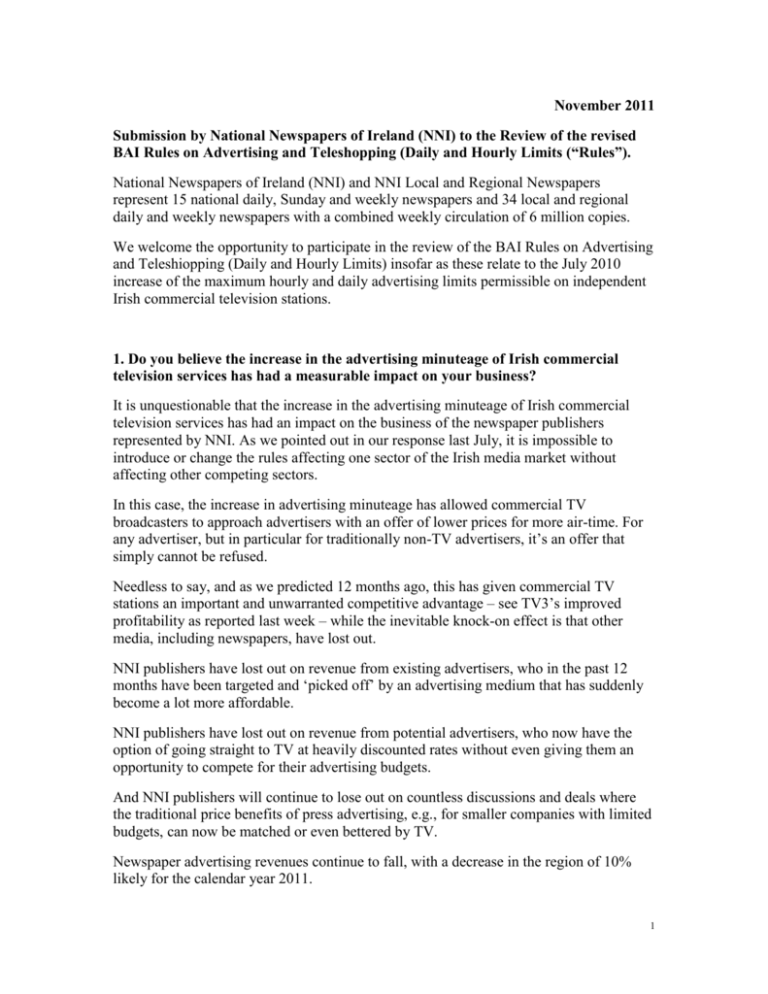
November 2011 Submission by National Newspapers of Ireland (NNI) to the Review of the revised BAI Rules on Advertising and Teleshopping (Daily and Hourly Limits (“Rules”). National Newspapers of Ireland (NNI) and NNI Local and Regional Newspapers represent 15 national daily, Sunday and weekly newspapers and 34 local and regional daily and weekly newspapers with a combined weekly circulation of 6 million copies. We welcome the opportunity to participate in the review of the BAI Rules on Advertising and Teleshiopping (Daily and Hourly Limits) insofar as these relate to the July 2010 increase of the maximum hourly and daily advertising limits permissible on independent Irish commercial television stations. 1. Do you believe the increase in the advertising minuteage of Irish commercial television services has had a measurable impact on your business? It is unquestionable that the increase in the advertising minuteage of Irish commercial television services has had an impact on the business of the newspaper publishers represented by NNI. As we pointed out in our response last July, it is impossible to introduce or change the rules affecting one sector of the Irish media market without affecting other competing sectors. In this case, the increase in advertising minuteage has allowed commercial TV broadcasters to approach advertisers with an offer of lower prices for more air-time. For any advertiser, but in particular for traditionally non-TV advertisers, it’s an offer that simply cannot be refused. Needless to say, and as we predicted 12 months ago, this has given commercial TV stations an important and unwarranted competitive advantage – see TV3’s improved profitability as reported last week – while the inevitable knock-on effect is that other media, including newspapers, have lost out. NNI publishers have lost out on revenue from existing advertisers, who in the past 12 months have been targeted and ‘picked off’ by an advertising medium that has suddenly become a lot more affordable. NNI publishers have lost out on revenue from potential advertisers, who now have the option of going straight to TV at heavily discounted rates without even giving them an opportunity to compete for their advertising budgets. And NNI publishers will continue to lose out on countless discussions and deals where the traditional price benefits of press advertising, e.g., for smaller companies with limited budgets, can now be matched or even bettered by TV. Newspaper advertising revenues continue to fall, with a decrease in the region of 10% likely for the calendar year 2011. 1 In one of the most difficult trading periods imaginable, with the situation unlikely to improve in the immediate future, the change in the BAI rules have had a significant, negative impact on newspaper publishers. This impact must therefore be described as “measurable”. Just how this impact is to be measured is another question. NNI believes that it will be impossible to accurately measure, or properly assess, the impact of the increase in advertising minutes without the commissioning of objective, reasoned and independent analysis, based on hard data, enabling the BAI to make decisions on a fully-informed basis. NNI maintains that BAI’s failure to do this last July resulted in a misguided decision to increase minuteage which has given commercial TV operators a significant unfair advantage in revenue terms to the detriment of other media, including newspapers. The BAI now has the opportunity to ensure that the analysis is properly conducted and NNI trusts that the methodology and results of the analysis will be fully set out in the forthcoming published review. 2. What form has this impact taken? Price pressure (if so please provide achieved revenue per display advertising page per month for last three years [or equivalent] with explanation of when relevant commercial deals were struck As the BAI will appreciate, NNI is not in a position to provide data in the form requested. The BAI could consider approaching individual publishers with a view to obtaining relevant data. However, it is accepted that achieved revenue figures have declined significantly. One of our biggest members has informed us that the average yield per colour page display has declined by 17% over the period. NNI maintains that the increased minuteage enjoyed by commercial TV has contributed to this decline. Volume pressure (if so, please provide average display ad pages by month for last three years) The volume of a newspaper is directly related to its pagination and, in the past two years, newspaper pagination has been significantly reduced – as evidenced by a 33% decline in newsprint consumption. NNI maintains that the increased minuteage enjoyed by commercial TV has contributed to this decline. Again, NNI is not in a position to obtain data from all of its member titles in order to demonstrate the impact that the increased minuteage has had on volume. 2 Other (please explain) While commercial TV broadcasters have won revenue from other TV channels, they have also succeeded in wooing some non-TV advertisers. There are numerous advertisers who have been on air with TV3 (and no other channel) since the new rules came into play in August 2010, none of which advertised with TV3 the previous year. We estimate that these new advertisers spent in the region of €400,000 with TV3 in the 14 months to September 2011. Advertisers that have only appeared on TV3 since the introduction of additional minuteage: Ballina Manor Hotel Bellinter House Blue September City of a Thousand Welcomes Clear Vision CRC Conroy (recycling) Curragh Carpets Douglas Village Shopping Centre Dromoland Collection Dublin Bay Taste & Music Festival Glasgow Piping Live Festival Greenman Events Griffith Hotel Group Grooveyard Productions Hospital Group Independent Irish Games IPASS Juvenile Diabetes Research Foundation Justgo.ie Laois County Council Learn Irelan Maguire Residential Property Rotary Watches Silver Springs Staedtler Ltd Station House TJ O’Mahony Builders Providers Top Image Vita Liberata Weddings To Plan Wow Brown Most of these advertisers would have a clear choice to advertise in newspapers instead of (or as well as) TV3 (see our response to Question 3 below). NNI believes that, in many cases, TV3 has offered advertising at highly discounted rates to fill vacant advertising slots (which newspapers could simply not have competed for given the costs of newsprint). NNI believes that, in order correctly to assess the impact of increased minuteage, the BAI should talk to these advertisers and agencies and ascertain the circumstances in which the advertising was given to TV3 rather than to newspapers or other media. 3 3. How do advertisers choose between press and TV? Each medium has its own strategic and creative strengths, and advertisers would typically consider a range of issues before finalising their media mix: o What is the target audience and which medium is more likely to hit the right people at the right time in the right place? In this respect, the press offers specific sections and supplements for different sectors, whilst TV is often seen as the better option for youth-orientated advertising. o What is the nature of the message and which medium is likely to have the most impact in getting that message across? The press is seen as a good medium for presenting detail and price (e.g., for supermarkets wanting to display multiple pricing), whilst TV can be used for brand-building or for showing off a product in a dynamic way. o Is this part of a campaign and, if so, how often do we need to repeat the message and for how long? The press is good for making immediate/shortterm announcements, which TV may be used to build mass awareness quickly. o Last but not least, which medium can we afford? In light of the increase in advertising minuteage for independent TV broadcasters, the last issue is of particular significance for advertisers who have a choice between different media. There are certain types of advertisers who traditionally ‘belong’ to one advertising medium or another: global consumer brands, for example, are core TV advertisers; retailers tend to opt for press. That leaves a significant middle ground that all media compete for; advertisers whose products or services are suitable for either press or TV (or indeed radio), and whose decision ultimately comes down to what they can afford. By increasing minuteage and therefore the advertising capacity of Irish commercial television broadcasters, the BAI has effectively lowered the entry level for TV advertising and has dramatically increased the likelihood of traditional press advertisers – banks, importers, distributors, retail firms and others – moving away from the press in favour of TV. The increased minuteage available to TV3 – and the station’s capacity to also produce commercials at lower cost – means they can, and do, chase clients of the press. 4 4. Which advertisers are most likely switchers between newspapers and radio advertising? Is there evidence that they have in fact switched to TV? For many advertisers, press and radio are complementary media channels. In fact, when planning a campaign it is unlikely that an advertiser would adopt an either-or approach to press/radio; radio brings a message to life in a dynamic way while press can provide the detail. We do not have hard evidence of advertisers switching away from both press and radio in favour of TV, although a cursory scan of any ad break on TV3 suggests that they have (especially where an advertisement is “static” with sound). Now that the entry level to TV advertising has been lowered, it is clear that many advertisers have moved their budget to TV in the past year. (These companies were simply not on TV previously, but would have used the press and/or radio.) We refer again to the list of companies in our response to question 2. 5. What actions (if any) have you taken to mitigate the impact of the increased minuteage? It is, of course, for the publishers of the newspaper titles to take whatever specific actions can be taken to mitigate the impact of the increased minuteage. What NNI can itself do is to remind advertisers and agencies of the traditional, unique strengths of the newspaper advertising medium – we run an ongoing NNI Press Ad of the Month competition primarily for ad agencies, and place regular press campaigns designed to highlight the uses of the medium. In general terms, there are severe limits on what can be done by individual publishers. With the continuing decline in advertising revenues, NNI member titles were already under severe financial pressure before the changes were introduced. When it comes to negotiating with advertisers who have a choice between newsprint and commercial TV stations enjoying the benefits of increased minuteage, newspaper publishers cannot compete on price without driving yields even lower and putting themselves under even greater financial pressure. It should be noted that, unlike TV, newspapers also have to pay for any increase in advertising by buying additional newsprint. NNI’s position is that the increase in minuteage was a misguided decision resulting in commercial TV enjoying an unfair competitive advantage over other media including the newspapers. All NNI titles have to compete in the advertising market place and have had to make huge adjustments in the recent past to make themselves more competitive. They should not, however, be expected to “mitigate” the impact of an inherently unfair measure which has improperly rebalanced the advertising market in favour of commercial TV. 5 6. What is your estimate of the financial impact on your business from increased minuteage? See our response to question 2. Specific information relating to our members’ financial performance is not available. 7. Are there any other issues you believe the BAI should consider in assessing the impact of increased minuteage? Lack of consideration of impact on all media stakeholders NNI repeats the statement, made in its July 2010 submission, that the BAI has a particular responsibility not to take decisions relating to the Irish broadcasting sector without paying proper regard to the effects on other areas of the media. It was and is our contention that the BAI must consider all media stakeholders in its decision-making. This does not appear to have been the case in granting TV stations increased minuteage. The knock-on effect of this decision in relation to newspapers and other media has had, and will continue to have, serious consequences. The BAI must now take the opportunity to reverse its decision. A level playing field At a stroke, the BAI handed commercial TV stations a significant and unwarranted competitive advantage over newspapers and other media. This has created a distortion in the advertising market; not just from the perspective of newspapers but also within the broadcasting sector. The BAI has failed to maintain a level playing field, which it is now duty-bound to restore. Will other broadcasters now seek parity with their commercial counterparts? Some already have. If parity is given, this will even further affect the position of newsprint and other non-regulated media. An advertising war? We believe that the increased minuteage could trigger an unacceptable advertising war between the TV and print sectors, with the latter fighting with one hand tied behind their back. This would be a “race to the bottom”, with Irish newspapers almost bound to lose with more titles closing. The NNI cannot believe that the BAI intended such a blatant inequality of arms, but this risk results from the BAI’s stated intentions to increase the commercial revenues of the commercial TV sector, at the expense of other media. There is also a significant risk that aggressive competition between the Irish TV sector and competitors in the wider European sector could end up neutralising the results sought by the BAI. In that case, no media business in Ireland will benefit from the decision to increase minuteage. 6 More RTÉ channels RTÉ’s imminent launch of the Saorview service will only exacerbate the problem as we see it. Extra channels means extra advertising time, more bargains (3 for 2 etc), discounts and lower prices for advertisers and further distortion of the market. The rise of teleshopping channels will only distort the market further. State protection for broadcast media Broadcast media operate under the protection of Government regulation; it is a safety net that actually helps TV (and radio) to increase their revenues. Indeed, the BAI “gave” extra minutes to commercial TV with the explicit objective of helping “to protect and stimulate Irish employment and sustain Irish programme content in a context where the television sector has suffered a significant decline in commercial revenue”. Irish newspapers have no such protection. As newspapers, we operate in one of the most open, free and fiercely competitive markets in the world. As competitors in the wider media market, newspapers are confronted with State-sponsored unfair competition from commercial TV stations. The increased minuteage for commercial TV stations has thus provided further ‘protection’ for TV broadcasters while exposing newspapers to unfair competition. A fair result? We do not think so. NNI repeats its call for a proper facts-based impact analysis and for the July 2010 decision increasing minuteage to be reversed. ends National Newspapers of Ireland and NNI Local and Regional Newspapers Our Members Irish Independent - Irish Examiner - The Irish Times - Irish Daily Star - Evening Herald - The Sunday Independent - Sunday World - The Sunday Business Post - Irish Mail on Sunday - Irish Farmers Journal Irish Daily Mail - Irish Daily Mirror - Irish Sun - Irish Sunday Mirror - The Sunday Times Our Local & Regional Members Metro Herald - Western People - Kildare Nationalist - Laois Nationalist - Carlow Nationalist - Waterford News & Star - Sligo Weekender - Enniscorthy Echo - Roscommon Herald - Evening Echo - Wexford Echo - Gorey Echo - New Ross Echo - Lucan Gazette - Blanchardstown Gazette - Dundrum Gazette - Swords Gazette - Castleknock Gazette - Dun Laoghaire Gazette - Enniscorthy Guardian - New Ross Standard Drogheda Independent - Fingal Independent - Carlow People - Wicklow People - The Argus - Bray People - The Corkman - Wexford People - The Kerryman - Sligo Champion - Malahide Gazette - Clondalkin Gazette - Gorey Guardian Contact: Frank Cullen Co-ordinating Director National Newspapers of Ireland (NNI) Clyde Lodge 15 Clyde Road Dublin 4 Tel 01 668 9099 E: fcullen@cullencommunications.ie 7
